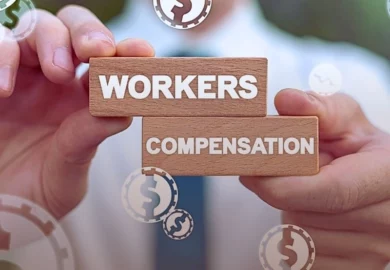Did you suffer a work-related injury on the job? Reporting work-related injuries might seem like a daunting process, but it doesn’t have to be.
Table of Contents

The sooner you report the injury, the better. Illinois has several laws regarding work-related injury reports, and it’s important to be aware of deadlines that may affect your claim and your right to recover compensation. Our workers’ compensation attorneys can guide you through the accident reporting process and help ensure that you avoid common claims mistakes.
When Should You Report Work-Related Injuries in Illinois?
You should report work-related injuries as soon as possible, providing you have sought medical care if necessary.
How long do you have to report an injury at work? Under Illinois workers’ compensation laws, you’ll typically have 45 days from the date of your injury to report it to your employer. Failing to report your workplace accident within the 45-day timeframe could cause you to forfeit your right to receive workers’ compensation benefits. Exceptions may apply in your situation, however.
For example, if you were diagnosed with carpal tunnel syndrome, or if you developed a medical condition that was caused by the exposure to harmful chemicals or toxins at the workplace, you would generally have 45 days from the day of the diagnosis.
Who Should Be Notified of Your Workplace Injury or Illness?
The initial work-related injury report should be made to your employer. You can notify a supervisor or manager, or follow your company’s procedure for reporting workplace accidents. Notifying other coworkers, however, won’t count.
The report can be done orally, but it is recommended to do it in writing while making a copy of your written notice and keeping it for yourself. In your written report, note your personal details, including your name, address, Social Security number, phone number, and the nature of your injury.
If the injury caused you to lose out on more than three days of work, your employer must notify the Workers’ Compensation Commission of the incident.
Common Mistakes to Avoid When Reporting Work-Related Injuries to Your Employer
There are some important pitfalls to avoid when reporting work-related injuries to your employer.
One of the most common mistakes injured workers make is taking too long to make an accident report. Waiting too long to report an accident can cause a variety of issues with your claim. First, the longer you wait to make a report, the less you may remember about the events that led up to your injury. Second, reporting an accident right away alerts your employer that a dangerous workplace condition exists. If you delay reporting your injury, you could put other workers at risk. Third, putting off your report may cause investigators to conclude that your injury wasn’t serious.
Another common mistake is going back to work too early. If a healthcare professional told you not to return to work, do not do so. Such an act can contradict your claim and be used against you by your employer as evidence that you were indeed capable of working, despite your claim to the contrary.
Remember, if you can’t work due to your injury, you may be able to get weekly financial payments in addition to medical care until you are deemed fit to return to work.
Another mistake injured employees make is falling for common workers’ comp delay tactics used by insurance companies and employers to avoid paying out compensation.
There are many such tactics. One is delaying the process by constantly asking you to submit additional forms and documentation about your case.
Another tactic insurance companies use is disputing your injuries or failing to communicate with you, even when you call or send multiple emails.
If you think that the insurance company or your employer is avoiding communication, using delay tactics, or otherwise trying to delay payment or release of funds, contact a workers’ compensation attorney in Chicago.
Insurance companies often change their tune once a lawyer comes into the picture. If they feel like they can push you around, they will. If there is an experienced attorney on your side, insurers will be more apt to avoid using such unethical tactics.
Not hiring an attorney is another one of the most common mistakes people make after suffering a workplace accident, as it often leads to unnecessary delays that could have been avoided.
Another mistake is not seeking a second medical opinion. If the doctor approved by your company says you should return to work when you don’t feel ready to do so, you are entitled to change your doctor at any time.
When do workers’ compensation benefits end? If you are declared fit to work, your workers’ comp benefits may end. Workers’ compensation benefits can last for several years or even longer, however, depending on the type of disability.
If you suffered an injury that caused a permanent total disability, and you will be unable to work for the rest of your life, the benefits may even be lifelong.
Consequences of Delayed Reporting
If you don’t report the incident to your employer within 45 days, you risk forfeiting compensation.
There are some exceptions to the 45-day deadline. For example, if the injury is due to radiological exposure, the deadline is 90 days from when you became aware (or started to suspect) that you were subject to an excessive dose of radiological exposure.
If you missed the 45-day deadline to report your work-related accident or occupational disease, reach out to workers’ compensation lawyers to discuss your claim and learn which avenues may still be available to you.
Resources for Reporting Work Related Injuries in Illinois
It’s important to know where to turn to for help after suffering a work-related injury in Illinois.
An attorney should be one of your first points of contact. A lawyer will be able to guide you through the process of reporting your accident, ensure you don’t miss deadlines, and keep you updated about the status of your claim.
An attorney will also:
- Document evidence to prove the validity of your claims, as well as the total value of the compensation.
- Follow up with the insurance companies to ensure they are fulfilling their legal obligations.
- Ensure your employer doesn’t discriminate or harass you due to your report.
- Make sure you are aware of your rights regarding seeking medical care.
The Illinois Workers’ Compensation Commission is another important resource you should know about.
What Is the Illinois Workers’ Compensation Commission?
The Illinois Workers’ Compensation Commission is a governmental commission that resolves disputes between employers and employees regarding work-related injury claims.
It has dedicated arbitrators and commissioners who review cases, although some cases may end up going to court. Usually, if there is an attorney involved, cases are resolved by settlements. This helps both parties avoid spending extensive resources on legal aid.
The Illinois Workers’ Compensation Commission also provides a handbook, which is accessible on its website for download. The handbook explains your rights under the Workers’ Compensation Act. It’s a good idea to go over this handbook if you suffered an injury on the job. Usually, a copy of this handbook will be sent to you shortly after you report the injury to your attorney.
While the Illinois Workers’ Compensation Commission cannot provide legal advice or answer legal questions about a claim, it can provide status updates and answer questions regarding the procedures of the Commission. The Commission can be reached via the email or phone number specified on its website.
For legal advice, you will need an experienced workers’ compensation attorney in Illinois.
The Illinois Workers’ Compensation Commission also accepts and investigates complaints made regarding misconduct against Commission arbitrators and refusal of State services and benefits due to discrimination based on race, sex, sexual orientation, disability, age, national origin, and other protected classes.
If you suffered injuries in a work-related accident, or you were diagnosed with an occupational disease, make sure to report the incident to your employer as soon as possible. Then reach out to the experienced workers’ compensation attorneys at Ankin Law in Chicago for a free, no-obligation consultation. There are no upfront fees when you hire our law firm, and you won’t pay any attorney fees unless we win on your behalf.



